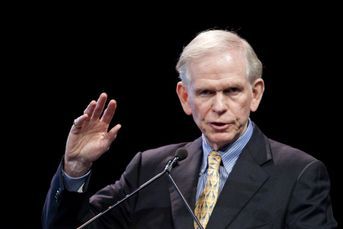High-speed trading rules coming from SEC, White says
Proprietary traders who use computers to buy and sell stocks in milliseconds would have to register with the agency under chair's recommendations.
Securities and Exchange Commission Chair Mary Jo White unveiled the regulator’s most sweeping plan yet for reining in high-frequency trading and monitoring dark pools and other secretive trading practices in the world’s largest equity market.
Proprietary traders who use computers to buy and sell stocks in milliseconds would have to register with the SEC under recommendations made public Thursday by Ms. White in New York.
Operators of dark pools, broker-owned venues that compete with exchanges and don’t publish bids and offers, would have to provide the regulator with their rules for matching buyers and sellers, Ms. White said.
The SEC is aiming to bring more transparency to markets and address claims of unfair advantages held by traders that account for about half of U.S. stock executions and have been blamed for everything from the flash crash of May 2010 to market volatility during the European debt crisis. The agenda outlined Thursday could affect stock exchanges, brokerages and a class of proprietary traders that have so far escaped oversight.
“The SEC should not roll back the technology clock or prohibit algorithmic trading, but we are assessing the extent to which specific elements of the computer-driven trading environment may be working against investors rather than for them,” Ms. White told the Sandler O’Neill & Partners Global Exchange and Brokerage Conference.
NEW SCRUTINY
The SEC joins the Commodity Futures Trading Commission, which has previously said it was considering registration for high-speed traders of futures.
High-frequency trading has also drawn scrutiny from law enforcement. The Federal Bureau of Investigation is examining whether traders abuse information to act ahead of orders by institutional investors. New York Attorney General Eric Schneiderman is investigating whether U.S. stock exchanges and alternative venues give high-frequency traders improper advantages and has called on regulators to tighten oversight.
Mr. Schneiderman, in a posting on his Twitter account, said he was “pleased to see” Ms. White’s comments “calling for market reforms to curb unfair advantages for HFT.”
Automated trading has achieved wider renown since the publication of Michael Lewis’s book “Flash Boys” and an announcement by one of the biggest firms, Virtu Financial Inc., to go public. Virtu’s offering has since been postponed.
High-frequency trading accounts for about 48% of all U.S. share volume, according to research firm Tabb Group. Such firms include Chopper Trading, Jump Trading and Tower Research Capital, all of whom have been subpoenaed as part of Mr. Schneiderman’s probe, a person familiar with the matter said in April.
The new registration requirements would apply to a subset of trading firms that aren’t registered as broker-dealers with the SEC. Rick Ketchum, chief executive officer of the Financial Industry Regulatory Authority Inc., said last month that such unregulated firms are often responsible for manipulative or disruptive trading seen by regulators.
“There still are a lot of smaller players and by forcing these firms to register there is going to be increased oversight on what she terms destabilizing HFT,” said Sal Arnuk, co-founder of brokerage Themis Trading.
The SEC is preparing a new rule that would require more oversight by traders of their algorithms, formulas that automate the buying and selling of shares, Ms. White said. While Ms. White said she was wary of setting speed limits on traders, the SEC will consider options for minimizing the speed advantage that some proprietary traders have.
MINIMIZING ADVANTAGES
“These could include frequent batch auctions or other mechanisms designed to minimize speed advantages,” she said. “They could also include affirmative or negative trading obligations for high-frequency trading firms that employ the fastest, most sophisticated trading tools.”
Under the plan Ms. White outlined Thursday, stock exchanges also will come in for more scrutiny. The SEC will review the exchanges’ dozens of order types, which have been criticized for adding complexity with little public benefit by Intercontinental Exchange Inc. (ICE) Chief Executive Officer Jeffrey Sprecher, whose Atlanta-based company owns the New York Stock Exchange.
EXCHANGES’ CONFLICTS
The majority of order types are designed to deal with the exchanges’ maker-taker pricing, a system of fees and rebates intended to attract orders from brokers. The maker-taker system can “create conflicts of interest and raise serious questions about whether such conflicts can be effectively managed,” Ms. White said.
Mr. Sprecher, who has said NYSE will reduce its order types by more than one dozen, said Ms. White’s speech shows the SEC is “engaged.”
“Obviously, the Flash Boys book has galvanized more people into looking at the way these markets work,” Mr. Sprecher told the conference in a separate appearance. “The markets can be much simpler and much easier to understand and doing so will bring more confidence to the way they operate.”
The SEC also will work with stock exchanges to address claims of unfairness in how order and price data reach the public. Traders buying direct feeds from exchanges get orders and prices faster than investors relying on the public ticker, a gap highlighted in Lewis’s book and criticized by New York-based trading-platform provider IEX Group Inc. CEO Brad Katsuyama.
“The commission has been aware of many of these issues for some time,” said Annette L. Nazareth, a partner at Davis Polk & Wardwell and a former SEC commissioner. “Over the course of time, there comes to be more consensus around the fact that something needs to be done about these issues.”
Operators of dark pools will also have to provide more information about their clients and how they process buy and sell orders, Ms. White said.
KCG Holdings Inc. (KCG), based in Jersey City, N.J., and New York-based Liquidnet Holdings Inc., which both operate dark pools, have already said they will publicize their dark-pool rule filings. KCG Holdings was formed last year by the merger of two dominant high-frequency traders, Getco and Knight Capital Group Inc.
“Transparency has long been a hallmark of the U.S. securities markets, and I am concerned by the lack of it in these dark venues,” Ms. White said.
The regulator also will wade into the debate over how brokers fill the orders of their institutional clients. The agency will develop a requirement that brokers tell investors where their stock trades go to be executed, Ms. White said. The initiative responds to complaints that routing decisions are sometimes made against a customer’s best interests.
The measures outlined today include proposals that have been embraced by some large brokers and investors and can be advanced in the near term. Ms. White cited, for instance, a proposed rule known as Regulation SCI that will require exchanges and some dark pools to guard against technology outages and failures. The SEC staff is preparing a recommendation for a final version of the rule, Ms. White said.
The SEC still envisions examining whether its own rules, including the package known as Regulation NMS, have driven excessive fragmentation and complexity, Ms. White said. The agency will create a new advisory committee of investors and others to help inform its initiatives and rule changes, she said.
SEC Commissioners Luis A. Aguilar and Michael Piwowar both said today the agency must consider how much its prior rulemaking, including its National Market System rules, have driven unhealthy changes in market behavior.
“We need to consider the extent to which the current regulatory regime, including Regulation NMS, has contributed to some of the problems we have seen and whether it should be revised and modified,” Mr. Aguilar said.
(Bloomberg News)
Learn more about reprints and licensing for this article.








